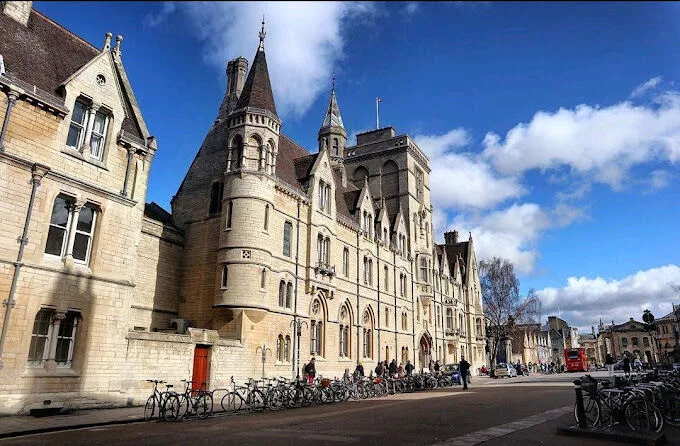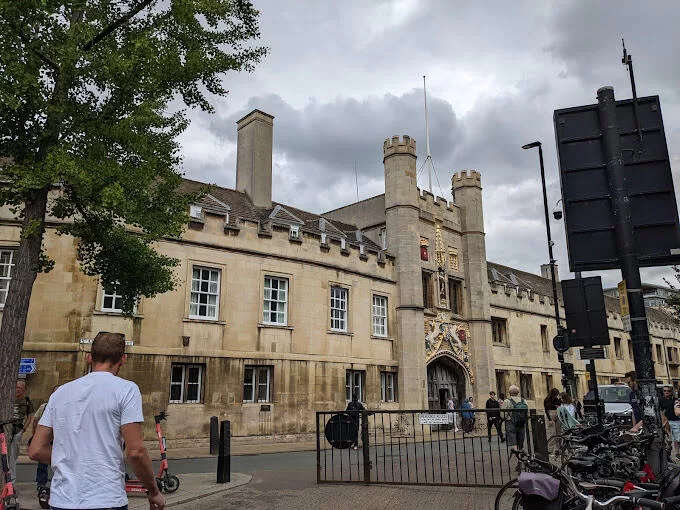Introduction to Anthropology
Anthropology, as a field of study, encompasses the study of human beings and their societies, cultures, and behavior throughout history. It is a multidisciplinary subject that combines elements of social sciences, humanities, and natural sciences to gain a comprehensive understanding of human evolution, culture, language, and social structures. From investigating ancient civilizations to exploring the intricacies of present-day societies, anthropology offers insights into the diversity of human experiences, beliefs, and practices, making it an intriguing and intellectually stimulating area of study.
When it comes to pursuing a degree in anthropology, choosing the right university is of paramount importance. The quality of education and resources available at the institution can significantly impact the depth and breadth of knowledge that students acquire during their studies. An excellent anthropology program provides a solid foundation in key theories, research methodologies, and fieldwork practices. It offers access to experienced and knowledgeable faculty members who can guide students in their academic journey and foster critical thinking and analytical skills. Additionally, a reputable university often has well-established connections with research institutions and cultural organisations, allowing for unique opportunities for practical application and field studies. Ultimately, selecting the best university for anthropology studies becomes crucial in shaping one’s educational experience and future career prospects within this fascinating field.
Understanding Search Criteria
When it comes to evaluating anthropology programs in order to determine the best universities in the UK for anthropology, there are several factors that prospective students should consider. These criteria provide valuable insights into the quality and suitability of an anthropology program and can greatly influence one’s educational experience and future career prospects. In this section, we will delve into the essential search criteria that should be taken into account when evaluating anthropology programs.
Research Quality
Research quality is a significant aspect to consider when evaluating anthropology programs. Look for universities that have a strong reputation in conducting groundbreaking research in the field of anthropology. This can be determined by exploring the faculty’s research interests, their publication records, and any ongoing research projects. Assessing the quality of research within a university will give you insight into the academic environment and the opportunities available for engagement in cutting-edge anthropological research.
Entry Standards
Examining the entry standards for anthropology programs is crucial to understand the level of academic rigor you can expect. Consider universities with high entry requirements as they often attract academically driven students and create an intellectually stimulating environment. Evaluate the typical entry requirements such as A-level results or equivalent qualifications, as well as any additional entrance exams or interviews that may be required.
Student Satisfaction
Student satisfaction plays a vital role in determining the quality of an anthropology program. Seek universities that prioritize student support services, including academic guidance and personal development opportunities. Look for institutions that provide access to fieldwork experiences, internships, and study abroad programs to enhance your learning and broaden your anthropological perspective. Additionally, reading student testimonials and reviews can offer valuable insights into the overall satisfaction of students studying anthropology at a given university.
Graduate Prospects
Assessing the graduate prospects of anthropology programs is essential to understand the opportunities for future career development. Look for universities that have a strong track record of graduate employment in relevant fields such as academia, research, cultural heritage, or consultancy. Explore statistics on graduate destinations, including the percentage of graduates employed, pursuing further study, or engaged in related research projects. Consider universities that offer career guidance and networking opportunities to support your transition from academia to the professional world.
Specialised Areas of Focus
Consider the specialised areas of focus within anthropology programs that align with your specific interests. Different universities may have distinct strengths in particular subfields of anthropology, such as social anthropology, cultural anthropology, biological anthropology, or archaeological anthropology. Assess whether the university’s faculty members have expertise in your area of interest, as this will greatly enhance your learning experience. Furthermore, evaluate whether the university provides research centers, societies, or events that cater to your specific area of focus.
Overall, by considering these essential search criteria when evaluating anthropology programs, you can identify the best universities in the UK that offer world-class education, research opportunities, high entry standards, positive student experiences, promising graduate prospects, and specialised areas of focus that align with your academic and career aspirations in the field of anthropology.
Top Universities for Anthropology in the UK
University of Oxford

The University of Oxford excels in various disciplines, and anthropology is no exception. The Department of Anthropology at Oxford boasts a diverse and distinguished faculty whose expertise spans the breadth of the field. From cultural anthropology to biological and evolutionary anthropology, Oxford offers a comprehensive curriculum that covers the multiple dimensions of human societies and their interaction with the environment.
Entry Requirements
To gain admission to the anthropology program at Oxford, prospective students are expected to meet rigorous academic criteria. This typically includes strong academic results, particularly in relevant subjects such as sociology, psychology, or biology. A solid foundation in research and critical thinking skills is also highly valued.
Notable Achievements and Graduate Outcomes
Oxford’s anthropology program has produced numerous notable achievements and has propelled many graduates towards successful career paths. The department has contributed significantly to groundbreaking research in various areas, including primatology, archaeology, and social anthropology. Oxford anthropologists have shed light on issues such as cultural diversity, social inequality, and human evolution. Graduates from the program go on to pursue successful careers in academia, research institutions, non-governmental organizations, and various government agencies.
Industry Connections and Research Quality
Oxford maintains strong connections with industry and research partners, ensuring that students have ample opportunities for practical and hands-on experiences. The department collaborates with renowned institutions worldwide, allowing students to participate in global research projects and gain exposure to different cultural contexts. With state-of-the-art facilities and resources, Oxford offers an exceptional research environment, enabling students to delve into interdisciplinary, cutting-edge research in anthropology.
For more information about the anthropology program at the University of Oxford, you can visit the following official university pages:
–Department of Anthropology
–University of Oxford
University of Cambridge

As an institution, the University of Cambridge consistently ranks among the top universities globally, recognized for its rigorous academic standards and commitment to intellectual pursuit. In the realm of anthropology, the university’s Department of Social Anthropology stands out as a leader in the field. The department offers a wide range of anthropology programs, allowing students to specialize in areas such as biological anthropology, archeology, and social anthropology.
Entry Requirements
Entry into the University of Cambridge for anthropology programs is highly competitive, reflecting the institution’s esteemed status. Prospective students typically require exemplary academic records and exceptional critical thinking skills. It is advisable to have a strong background in relevant subjects such as sociology, psychology, or humanities to maximize the chances of admission.
Notable Achievements and Graduate Outcomes
The university has a remarkable track record of notable achievements in anthropology. With a faculty composed of world-renowned experts, Cambridge fosters an environment conducive to groundbreaking research and scholarly contributions. The department’s research outputs are held in high regard in academic circles, addressing pressing issues in society and expanding the boundaries of anthropological knowledge.
Graduates of the anthropology programs at Cambridge enjoy a wealth of opportunities upon completing their studies. The university’s strong reputation enhances employability, with many alumni finding success in academia, research institutions, governmental organizations, and non-governmental organizations. The comprehensive education provided at Cambridge equips graduates with critical thinking, research, and analytical skills, which are highly regarded in various professional fields.
Industry Connections and Research Quality
In addition to academic excellence, the University of Cambridge boasts strong industry connections and research quality in the field of anthropology. The university collaborates with numerous external organizations, offering students valuable opportunities to engage with real-world projects. These connections provide a platform for students to network with professionals and gain practical experience, further enriching their learning and future career prospects.
To access official information about the anthropology programs at the University of Cambridge, you can visit the official university websites:
These websites provide comprehensive details about the courses offered, faculty members, research initiatives, and admissions procedures. It is always recommended to consult the official sources directly for the most up-to-date and accurate information.
London School of Economics and Political Science (LSE)

The London School of Economics and Political Science (LSE) stands proudly as one of the best universities in the UK for anthropology. Renowned for its academic excellence, LSE is a globally recognized institution at the forefront of social sciences and humanities research. Founded in 1895, LSE boasts a rich history of producing groundbreaking research and nurturing some of the finest minds in the field.
LSE’s Strengths and Specializations
LSE’s Department of Anthropology is dedicated to exploring the complexities of human societies, cultures, and social interactions across the world. With an emphasis on critical thinking and empirical research, the department equips students with a theoretical framework and methodological toolkit necessary to tackle societal challenges. LSE’s expertise spans a broad range of anthropological subfields, including cultural anthropology, social anthropology, economic anthropology, and political anthropology.
Entry Requirements
For prospective students interested in pursuing anthropology at LSE, the university has rigorous yet rewarding entry requirements. It typically requests high A-level or equivalent grades in social science or humanities subjects. As part of the application process, LSE places importance on personal statements that demonstrate a genuine passion for anthropology, critical thinking skills, and an ability to engage with complex social issues.
Notable Achievements and Graduate Outcomes
LSE has an impressive track record of producing exceptional anthropologists who lead in academia, research, policy-making, and other professional spheres. Graduates from LSE’s anthropology programs have gone on to contribute significantly to the field, publishing influential research and assuming prominent positions globally. LSE’s reputation for producing top-notch graduates in anthropology gives its alumni a competitive edge in the job market.
Industry Connections and Research Quality
LSE’s close ties with industry, governmental bodies, and research institutions further enhance its standing in the anthropology community. The university actively fosters strong connections with organizations, both in the UK and internationally, providing students with opportunities for internships, research collaborations, and networking. LSE’s commitment to research quality is exemplified by its faculty members, who are esteemed scholars and thought leaders in their respective fields.
To learn more about LSE’s Department of Anthropology, its programs, faculty, and research initiatives, please visit the following official university pages:
University College London (UCL)

UCL is known for its commitment to academic excellence, established through its rigorous programs and exceptional faculty members. The university offers a comprehensive range of anthropology courses, covering various subfields such as social anthropology, biological anthropology, and archaeology.
UCL’s Department of Anthropology is highly regarded for its cutting-edge research and innovative teaching methods. The department attracts internationally recognized scholars, who are at the forefront of their respective fields, contributing to significant advancements in anthropological knowledge.
Strengths and Specializations
UCL’s Department of Anthropology boasts a wide range of strengths and specializations, making it an ideal choice for aspiring anthropologists. It excels in areas such as medical anthropology, visual anthropology, environmental anthropology, and material culture studies. This diverse range of specializations allows students to explore their specific areas of interest and gain comprehensive knowledge in their chosen field.
Entry Requirements
UCL sets high entry standards to ensure that students admitted to its anthropology programs possess the necessary academic abilities and potential. Prospective students are generally required to have strong academic backgrounds, with minimum entry requirements including specific A-Level subjects or international equivalents. Admissions criteria may vary for different programs, thus it is recommended to consult the official UCL website for detailed information on specific entry requirements.
Notable Achievements and Graduate Outcomes
UCL’s anthropology graduates have achieved remarkable successes in various professional fields. Many alumni have gone on to pursue successful careers in academic research, becoming prominent figures in the anthropological community. Additionally, UCL alumni often excel in non-academic sectors, such as public policy, international development, cultural heritage management, and advocacy.
Industry Connections and Research Quality
UCL maintains strong connections with various industries, facilitating opportunities for students to engage in real-world applications of anthropology. The university collaborates with governmental organizations, NGOs, and research institutions, providing students with valuable internships, fieldwork placements, and networking opportunities. UCL’s research quality is highly regarded, and the Department of Anthropology actively contributes to global research output, producing significant publications and participating in collaborative ventures both nationally and internationally.
For more detailed information about UCL’s anthropology programs, entry requirements, faculty members, and research endeavors, please refer to the official university pages below:
These official pages will provide comprehensive insights into the university’s offerings and assist prospective students in making informed decisions about pursuing anthropology studies at UCL.
Durham University

Durham University, located in the historic city of Durham, is widely recognized as one of the best universities in the UK for anthropology. Renowned for its academic excellence and illustrious history dating back to the 19th century, Durham University offers a diverse range of programs, with anthropology being one of its flagship disciplines. The university’s commitment to research-driven education, exceptional faculty, and state-of-the-art facilities makes it an ideal choice for aspiring anthropologists.
Academic Excellence and Specializations
Durham University’s anthropology department stands out for its academic rigor and excellence. Its programs cover a wide spectrum of anthropological studies, including social anthropology, biological anthropology, and archaeological anthropology, among others. The university’s faculty comprises accomplished researchers and scholars who are actively engaged in pushing the boundaries of anthropological knowledge. Students benefit from the opportunity to explore various theoretical perspectives and gain hands-on experience through fieldwork, ensuring a well-rounded education.
Entry Requirements
To secure a place in Durham University’s anthropology program, aspiring students are typically required to meet specific entry requirements. These requirements may include a certain level of academic achievement, such as AAA or equivalent in A-levels, or an International Baccalaureate (IB) score of 38-40 points. The university also considers personal statements and references as important components of the application process. It’s worth noting that entry requirements may vary depending on the specific program and the applicant’s educational background.
Notable Achievements and Graduate Outcome
Durham University has a stellar reputation for producing exceptional graduates in anthropology. Upon completion of their studies, students are equipped with a deep understanding of anthropological theory, analytical skills, and critical thinking abilities, positioning them for success in various career paths. Many Durham anthropology graduates have gone on to pursue rewarding careers as researchers, consultants, policy advisors, and educators across the globe. The university’s extensive alumni network further enhances opportunities for networking and professional development.
Industry Connections and Research Quality
Durham University boasts strong industry connections and collaborations within the field of anthropology. The university maintains partnerships with renowned research institutions, museums, and organizations, allowing students and faculty to engage in cutting-edge research projects, fieldwork expeditions, and internships. This hands-on experiential learning enhances the quality of education offered and equips students with practical skills sought after in the job market. Additionally, Durham University’s research output in anthropology is consistently ranked among the best in the UK, contributing significantly to the advancement of the discipline.
To access official information about Durham University, its anthropology department, and the specific programs offered, you can visit their official website. The website provides detailed information about entry requirements, course structures, faculty profiles, research opportunities, industry partnerships, and various support services available for prospective and current students.
University of York

The University of York stands tall among the top universities in the UK, widely recognized for its academic excellence and research capabilities. Specifically, the university’s Department of Social Sciences boasts a stellar reputation in the field of anthropology. With a strong emphasis on interdisciplinary approaches and cutting-edge research, York provides an intellectually stimulating environment for scholars and students alike.
Academic Excellence and Specializations
The University of York’s Department of Social Sciences excels in the field of anthropology, offering a comprehensive range of courses and specializations. The department is known for its expertise in social and cultural anthropology, biological anthropology, visual anthropology, and medical anthropology. The faculty comprises renowned scholars who contribute significantly to their respective fields through groundbreaking research and publications. This commitment to academic rigor ensures that students receive an exceptional education and gain profound insights into the multifaceted nature of anthropology.
Entry Requirements
To gain admission to the anthropology program at the University of York, prospective students need to meet specific criteria. These typically include a strong academic background and a passion for social sciences. The exact entry requirements may vary depending on the level of study and the specific program. Applicants are encouraged to refer to the university’s official website for the most up-to-date and detailed information regarding entry requirements.
Notable Achievements and Graduate Outcomes
Graduates from the University of York’s anthropology program have achieved remarkable success in various professional fields. The interdisciplinary nature of the program equips students with critical thinking skills, research expertise, and a deep understanding of human societies. As a result, many alumni have gone on to pursue successful careers in academia, non-governmental organizations (NGOs), public policy, international development, and cultural heritage sectors. The university’s strong emphasis on employability ensures that graduates are well-prepared for the demands of the job market.
Industry Connections and Research Quality
The University of York maintains strong industry connections, facilitating opportunities for students to engage with professionals and gain real-world experience. The department collaborates with renowned research institutions, NGOs, and governmental bodies, fostering a vibrant intellectual community. This synergy between academia and industry reinforces the quality of research conducted at the university, contributing to the advancement of anthropological knowledge and its practical applications.
For more detailed and official information about the University of York’s anthropology programs, entry requirements, and faculty, please visit the official university website at:
Department of Social Sciences
University of York
University of Reading

The University of Reading stands as one of the preeminent institutions in the United Kingdom for students seeking a comprehensive education in anthropology. Renowned for its academic excellence, the university consistently ranks highly in national and international league tables. With a rich history dating back to 1892, the University of Reading has nurtured a reputation for providing students with a first-class education that combines theoretical knowledge with practical applications.
Academic Excellence and Specializations
The University of Reading excels in the field of anthropology, offering a diverse range of programs and specializations to suit the interests and career aspirations of its students. The department boasts a highly experienced faculty who are at the forefront of research in their respective areas of expertise. From cultural anthropology to biological anthropology, archaeology to forensic anthropology, students have access to a wide array of courses that ensure a well-rounded and thorough understanding of the discipline.
Entry Requirements
The University of Reading maintains high academic standards, attracting some of the brightest minds from both the UK and around the world. Prospective anthropology students are expected to meet rigorous entry requirements that reflect the university’s commitment to excellence. These requirements typically include a strong academic background, such as A-levels or their international equivalents, with specific subject prerequisites varying depending on the course. Additionally, the university assesses applicants based on their personal statement, references, and often requires an interview to determine their suitability for the program.
Notable Achievements and Graduate Outcome
The University of Reading has a proud history of producing exceptional anthropology graduates who go on to make significant contributions in their chosen fields. Alumni have found success in academia, research institutions, government organizations, and various industries, demonstrating the practical and versatile nature of their education. The university’s focus on critical thinking, research skills, and problem-solving equips graduates with the ability to navigate complex societal issues and contribute meaningfully to the world around them.
Industry Connections and Research Quality
Through its strong links with industry and research collaborations, the University of Reading ensures that its anthropology programs remain at the cutting edge of the discipline. Faculty members actively engage in groundbreaking research, contributing to important scholarly debates and informing policy decisions. The university’s commitment to research quality is reflected in its consistent ranking among the top institutions for anthropology research output in the UK. Furthermore, students benefit from the university’s close ties to relevant industries, enabling them to gain practical experience and develop valuable connections for their future careers.
For more detailed information on the University of Reading’s anthropology programs, entry requirements, and faculty, please visit the official university website:
University of Manchester

The University of Manchester is widely regarded as one of the best universities in the UK, and its Department of Anthropology contributes significantly to its academic excellence. With a rich history dating back over 100 years, the university has established itself as a leading institution for the study of anthropology.
Academic Excellence and Specializations
The University of Manchester’s Department of Anthropology consistently ranks among the top in the UK and globally. Its commitment to academic excellence is reflected in its world-class faculty and research facilities. The department offers a range of undergraduate and postgraduate programs, allowing students to specialize in various areas such as social anthropology, medical anthropology, visual anthropology, and biological anthropology. The diverse range of specializations ensures that students receive a well-rounded education and develop critical insights into the human condition.
Entry Requirements
The University of Manchester sets high standards for admission into its anthropology programs. Admissions criteria typically include strong academic performance in relevant subjects, such as social sciences or humanities, along with demonstrable interest in anthropological research and theory. Prospective students are encouraged to check the official university website for specific entry requirements for each program.
Notable Achievements and Graduate Outcomes
The University of Manchester’s Department of Anthropology boasts a long list of notable achievements. Its faculty members are respected scholars and researchers who have made significant contributions to the field. The department’s graduates have gone on to establish successful careers in academia, research, international organizations, non-governmental organizations, and various other sectors. The education and training received at the University of Manchester provide graduates with a strong foundation to excel in their chosen career paths.
Industry Connections and Research Quality
The University of Manchester maintains excellent industry connections, allowing students to engage with real-world applications of anthropological knowledge. The university’s strategic location in Manchester, a vibrant and diverse city, further enhances opportunities for collaboration and fieldwork. The Department of Anthropology actively fosters partnerships with local community organizations and international research institutions, providing students with unique research opportunities. The department’s commitment to high-quality research is evident in its extensive publications, ongoing projects, and participation in global research networks.
To learn more about the University of Manchester’s Department of Anthropology, you can visit their official website.
Conclusion
In conclusion, this article has explored some of the best universities in the UK for studying anthropology. We have highlighted the excellent programs, research opportunities, and resources offered by these institutions. The key takeaways indicate that the University of Oxford and the University of Cambridge are renowned for their prestigious anthropology departments and their contributions to the field. Other universities such as University College London, Durham University, and the University of York also offer outstanding anthropology programs, combining theoretical knowledge with practical experiences.
For readers who are considering pursuing anthropology studies, it is highly encouraged to explore further and gather more information about these universities by visiting their official websites. Each university website provides comprehensive details about their anthropology departments, admission requirements, faculty members, and research projects. Seeking guidance from academic advisors or connecting with current students can also be beneficial in making an informed decision about which university aligns best with individual interests and career goals. Studying anthropology is an exciting and intellectually stimulating journey, and these universities mentioned above offer top-quality education and opportunities for students to excel in this field.
FAQs
What criteria should I consider when choosing the best anthropology program?
When choosing the best anthropology program, several criteria should be considered. Firstly, look for universities with a strong reputation in anthropology, preferably ranking high in subject-specific rankings. Consider the expertise and research interests of the faculty members, as well as the range and diversity of courses offered. Access to relevant resources, such as well-equipped laboratories, libraries, and fieldwork opportunities, should also be considered. Additionally, the university’s overall academic environment, student support services, and networking opportunities within the field of anthropology can impact your educational experience.
Are there scholarships available for anthropology programs in top UK universities?
Yes, there are scholarships available for anthropology programs in top UK universities. Many institutions offer scholarships and funding opportunities specifically for international students. These may include merit-based scholarships, need-based grants, and research grants. It is advisable to visit the websites of individual universities or contact their scholarship offices for specific information and application procedures.
Can international students apply for anthropology programs in the UK, and what are the entry requirements?
International students can apply for anthropology programs in the UK and are welcomed in many universities. Entry requirements for international students typically include academic qualifications equivalent to UK high school qualifications, such as A-levels or the International Baccalaureate (IB). English language proficiency, as demonstrated through tests like the IELTS or TOEFL, is also necessary. Entry requirements may vary between universities, so it is important to check the specific requirements of each institution.
Do anthropology programs in the UK offer practical fieldwork or international exposure?
Yes, anthropology programs in the UK often offer practical fieldwork opportunities and international exposure. Fieldwork is an integral part of anthropology, and universities understand its significance in gaining practical experience and conducting research. Many programs include fieldwork modules or provide students with opportunities to participate in archaeological digs, ethnographic studies, or engage with local communities. International exposure can be gained through study abroad programs or collaborative research projects with international partners.
How do anthropology graduates benefit from studying at top UK universities for their career prospects?
Studying anthropology at top UK universities can benefit graduates in several ways for their career prospects. Firstly, the reputation and prestige of a university can open doors to job opportunities. Well-established universities often have strong networks and alumni connections, providing access to a wide range of career options. Additionally, universities may offer career services, internships, and placement programs that can enhance employability. The interdisciplinary nature of anthropology equips graduates with various transferable skills, such as critical thinking, research, cultural awareness, and effective communication. These skills are valued in fields like academia, research, international organizations, government agencies, non-profit organizations, and cultural heritage sectors. Furthermore, anthropology graduates from top UK universities may benefit from the global recognition and high standards associated with their degree, increasing their competitiveness in the job market.




